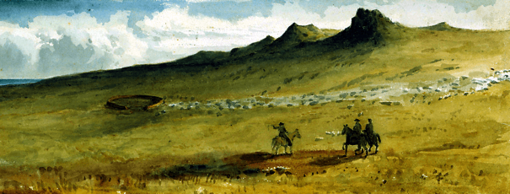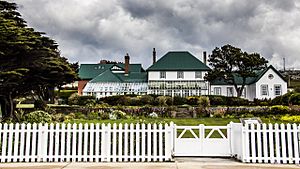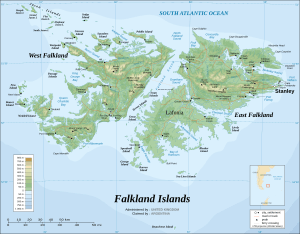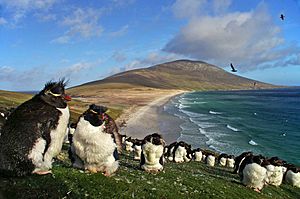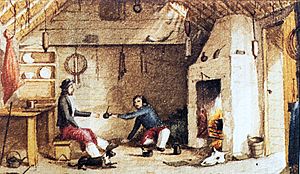Falkland Islands facts for kids
Quick facts for kids
Falkland Islands
|
|||
|---|---|---|---|
|
|||
| Motto(s):
"Desire the Right"
|
|||
| Anthem: "God Save the King" | |||
| Unofficial anthem: "Song of the Falklands" | |||
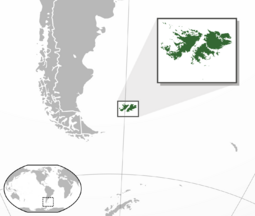
Location of the Falkland Islands
|
|||
| Sovereign state | |||
| First settlement | 1764 | ||
| British rule reasserted | 3 January 1833 | ||
| Falklands War | 2 April to 14 June 1982 |
||
| Current constitution | 1 January 2009 | ||
| Capital and largest settlement
|
Stanley 51°41′43″S 57°50′58″W / 51.69528°S 57.84944°W |
||
| Official languages | English | ||
| Demonym(s) | Falkland Islander, Falklander | ||
| Government | Devolved parliamentary dependency under a constitutional monarchy | ||
|
• Monarch
|
Charles III | ||
|
• Governor
|
Alison Blake | ||
| Andy Keeling | |||
| Legislature | Legislative Assembly | ||
| Area | |||
|
• Total
|
12,173 km2 (4,700 sq mi) | ||
|
• Water (%)
|
0 | ||
| Highest elevation | 705 m (2,313 ft) | ||
| Population | |||
|
• 2021 census
|
3,662 (not ranked) | ||
|
• Density
|
0.30/km2 (0.8/sq mi) | ||
| GDP (PPP) | 2013 estimate | ||
|
• Total
|
$228.5 million | ||
|
• Per capita
|
$96,962 (4th) | ||
| Gini (2015) | ▲ 36.0 medium |
||
| HDI (2010) | 0.874 very high · not ranked |
||
| Currency | Pound sterling Falkland Islands pound (£) (FKP) |
||
| Time zone | UTC– 03:00 (FKST) | ||
| Date format | dd/mm/yyyy | ||
| Driving side | left | ||
| Calling code | +500 | ||
| UK postcode |
FIQQ 1ZZ
|
||
| ISO 3166 code | FK | ||
| Internet TLD | .fk | ||
The Falkland Islands (faw(l)k-LƏND-,_-FOLK--; Spanish: Islas Malvinas) are a group of islands in the South Atlantic Ocean. They sit on the Patagonian Shelf, which is a shallow part of the ocean floor. The main islands are about 300 miles (480 kilometres) east of South America's southern coast. They are also about 752 miles (1,210 kilometres) from the northern tip of the Antarctic Peninsula.
The Falklands cover an area of 4,700 square miles (12,000 square kilometres). They include East Falkland, West Falkland, and 776 smaller islands. The islands are a British overseas territory. This means they manage their own affairs, but the United Kingdom handles their defense and foreign relations. The capital and largest town is Stanley on East Falkland.
People believe the islands were empty before Europeans found them in the 17th century. Many countries have claimed or settled the islands over time. These include France, Britain, Spain, and Argentina. Britain took back control in 1833. However, Argentina still claims the islands today. In April 1982, Argentina's military invaded the islands. British rule was restored two months later after the Falklands War. In a 2013 vote, almost all Falklanders chose to remain a UK territory. The ownership of the islands is still a disagreement between Argentina and the UK.
The population was 3,662 people in 2021. Most residents are Falkland Islanders, mainly of British background. Some people also have French, Gibraltar, or Scandinavian roots. More people have moved from the UK, Saint Helena, and Chile. This has helped the population grow. The main language is English, which is also the official language. Falkland Islanders are British citizens under a 1983 law.
The islands have a cool, windy, and wet climate. They are home to many birds. However, some bird species no longer breed on the main islands. This is because of animals brought in by people. The main economic activities are fishing, tourism, and sheep farming. They focus on exporting high-quality wool. Oil exploration is also happening. This is a bit controversial because of disagreements with Argentina.
Contents
Island Names: Falklands & Malvinas
The name "Falkland Islands" comes from Falkland Sound. This is the narrow channel between the two main islands. John Strong, an English captain, named the channel in 1690. He honored Anthony Cary, 5th Viscount Falkland, who helped fund his trip. The Viscount's title came from a town in Scotland called Falkland. The town's name likely means "enclosure" in Scottish Gaelic.
The name "Falklands" was first used for the islands in 1765. British captain John Byron claimed them for King George III. He called them "Falkland's Islands." "Falklands" is now a common short name for the islands.
The Spanish name for the islands is Islas Malvinas. This comes from the French name Îles Malouines. French explorer Louis-Antoine de Bougainville gave them this name in 1764. He started the first settlement on the islands. He named the area after Saint-Malo, the port his ships sailed from. This port in France was named after St. Malo, a Christian evangelist.
In 1965, the United Nations General Assembly decided on the names. For all languages except Spanish, UN documents use Falkland Islands (Malvinas). In Spanish, they use Islas Malvinas (Falkland Islands).
A Brief History of the Falkland Islands
The Falkland Islands were likely empty before Europeans arrived. Some people think Fuegians from Patagonia might have visited them. European claims of discovery go back to the 1500s. But it's not clear if they saw the Falklands or other islands. The first confirmed landing was by English captain John Strong in 1690. He explored Falkland Sound and found water and game.
The islands stayed empty until 1764. French captain Louis Antoine de Bougainville started Port Louis on East Falkland. In 1765, Captain John Byron founded Port Egmont on Saunders Island. Historians debate if these settlements knew about each other. In 1766, France gave its claim to Spain. Spain renamed the French colony Puerto Soledad.
Problems started when Spain found and captured Port Egmont in 1770. A war was almost started. But Britain got Port Egmont back in 1771. Both British and Spanish settlements existed until 1774. Britain then pulled its soldiers out, leaving a sign claiming the islands. Spain's Viceroyalty of the Río de la Plata became the only official presence. West Falkland was left empty. Puerto Soledad became a place for prisoners.
During the Napoleonic Wars, the islands' governor left in 1806. Spain's remaining soldiers followed in 1811. Only some gauchos (South American cowboys) and fishermen stayed. After this, only fishing ships visited the islands. Their political status was not argued until 1820. That year, an American privateer named David Jewett announced Argentina's claim. Argentina had claimed Spain's South Atlantic territories in 1816.
Since no one lived there permanently, Buenos Aires gave permission to Luis Vernet in 1823. He was a German merchant. He could fish and use wild cattle on the islands. Vernet settled at the old Puerto Soledad in 1826. He gathered resources to start a permanent colony. Buenos Aires made Vernet the military and civil leader in 1829. He tried to control sealing to stop foreign hunters.
Vernet's plan ended after a dispute over fishing rights. In 1831, the American warship USS Lexington raided the settlement. Its commander, Silas Duncan, declared the island's government dissolved.
Buenos Aires tried to regain control by sending soldiers in October 1832. But the soldiers rebelled within a month. The next year, British forces arrived. They reasserted Britain's rule. Argentina protested Britain's actions. Argentine governments have continued to protest ever since.
The British soldiers left after their mission. The area was left without formal government. Vernet's assistant, Matthew Brisbane, returned to restart the business. But his efforts ended when a gaucho named Antonio Rivero led a group to murder Brisbane and other leaders. Survivors hid until the British returned and restored order. In 1840, the Falklands became a Crown colony. Scottish settlers then started a sheep farming community.
Four years later, most people moved to Port Jackson. It was seen as a better place for the government. A merchant named Samuel Lafone started a plan to encourage British settlement. Stanley, as Port Jackson was soon renamed, became the official capital in 1845. Early on, Stanley had a bad reputation. Ships only stopped there in emergencies.
However, the Falklands' location was great for ship repairs. It was also good for the "Wrecking Trade." This was the business of buying and selling shipwrecks and their cargo. Besides this, there was little other business. Wild cattle hides were not worth much. Economic growth started only after 1851. The Falkland Islands Company bought Lafone's business. They successfully brought in Cheviot sheep for wool farming. This encouraged other farms to do the same.
The cost of importing materials was high. There was also a shortage of workers. This made ship repair too expensive. After 1870, this trade declined. Sail ships were replaced by steamships. By 1914, the Panama Canal opened, and the trade mostly ended. In 1881, the Falkland Islands became financially independent from Britain. For over a century, the Falkland Islands Company controlled trade and jobs. It also owned most homes in Stanley. The wool trade with the UK greatly benefited the islands.
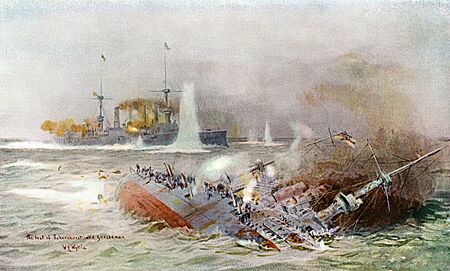
In the first half of the 1900s, the Falklands were important for Britain's claims. These claims were to subantarctic islands and parts of Antarctica. The Falklands governed these areas as the Falkland Islands Dependencies from 1908 until 1985. The Falklands also played a small role in both world wars. They served as a military base to control the South Atlantic. In December 1914, during the First World War, a British fleet defeated a German squadron. This was the Battle of the Falkland Islands.
In the Second World War, the damaged HMS Exeter came to the Falklands for repairs. This was after the 1939 Battle of the River Plate. In 1942, soldiers on their way to India were sent to the Falklands. This was due to fears of a Japanese attack. After the war, the Falklands' economy suffered. Wool prices dropped. There was also political uncertainty from the renewed dispute with Argentina.
Tensions between the UK and Argentina grew in the second half of the century. Argentine President Juan Perón claimed the islands. The dispute became more intense in the 1960s. This was after the United Nations passed a resolution on decolonisation. Argentina saw this as favoring its claim. In 1965, the UN passed Resolution 2065. It asked both countries to talk to find a peaceful solution.
From 1966 to 1968, the UK secretly discussed giving the Falklands to Argentina. They thought the islanders would agree. In 1971, an agreement was made on trade links. Argentina then built a temporary airfield in Stanley in 1972. However, Falklanders strongly disagreed. Their strong voice in the UK Parliament limited talks until 1977.
The UK government, led by Margaret Thatcher, worried about the cost of keeping the Falkland Islands. They again thought about giving control to Argentina. Serious talks about ownership ended by 1981. The dispute grew worse. In April 1982, the Falklands War began. Argentine military forces invaded the Falklands. They also invaded other British territories in the South Atlantic. British forces retook the territories in June.
After the war, the UK increased its military presence. They built RAF Mount Pleasant and added more soldiers. The war also left about 117 minefields. These contained nearly 20,000 mines. Initial attempts to clear the mines stopped in 1983. This was due to many injuries to deminers. Mine clearing started again in 2009 and finished in October 2020.
Based on Lord Shackleton's advice, the Falklands changed their economy. They moved from just sheep farming to tourism and fishing. This happened after they created an exclusive economic zone. The road network was also improved. Building RAF Mount Pleasant allowed for long haul flights. Oil exploration began in the 2010s. There were signs of possible oil deposits. Mine clearance work restarted in 2009. This was part of the UK's duties under the Ottawa Treaty. Sapper Hill Corral was cleared of mines in 2012. This allowed access to a historic site for the first time in 30 years. Argentina and the UK restarted diplomatic relations in 1990. But they still disagree on future talks about ownership.
How the Falkland Islands are Governed
The Falkland Islands are a self-governing British Overseas Territory. This means they manage their own internal affairs. The 2009 Constitution gives them full internal self-government. The UK is in charge of foreign affairs. It also has the power to protect UK interests and ensure good governance.
The Monarch of the United Kingdom is the head of state. The governor acts on the monarch's behalf. The governor appoints the islands' chief executive. This is done with advice from the Legislative Assembly. Both the governor and chief executive lead the government.
Alison Blake became Governor in July 2022. Andy Keeling became Chief Executive in April 2021. Stephen Doughty is the UK minister responsible for the Falkland Islands since 2024. He handles British foreign policy for the islands.
The governor follows the advice of the islands' Executive Council. This council includes the chief executive and the Director of Finance. It also has three elected members from the Legislative Assembly. The governor leads this council.
The Legislative Assembly has one chamber. It includes the chief executive, the director of finance, and eight elected members. Five members are from Stanley and three from Camp. They are elected for four-year terms by all adult citizens. All politicians in the Falkland Islands are independent. There are no political parties. Since the 2013 election, members of the Legislative Assembly get a salary. They are expected to work full-time.
The Falklands were part of the European Union's overseas territories until 2020. The islands' legal system is based on English law. It is overseen by the Foreign and Commonwealth Office. The constitution follows the rules of the European Convention on Human Rights. Residents can appeal to the European Court of Human Rights. Law enforcement is handled by the Royal Falkland Islands Police.
Defence of the Islands
The United Kingdom provides defense for the islands. A British military base is located there. The Falkland Islands government also pays for a small local defense force. This force is called the Falkland Islands Defence Force. The Falklands claim an exclusive economic zone (EEZ) that extends 200 nmi (370 km) from its coast. This is based on the United Nations Convention on the Law of the Sea. This zone overlaps with Argentina's EEZ.
Dispute Over Ownership
Both the UK and Argentina claim ownership of the Falkland Islands. The UK says its claim is based on its continuous control since 1833. It also relies on the islanders' right to self-determination. Argentina claims it got the Falklands from Spain when it became independent in 1816. The events of 1833 are very controversial. Argentina sees it as Britain taking over. The UK sees it as simply reasserting its claim.
In 2009, British Prime Minister Gordon Brown met with Argentine President Cristina Fernández de Kirchner. He said there would be no more talks about the Falklands' ownership. In March 2013, the Falkland Islands held a vote on their political status. 99.8% of voters chose to remain a British overseas territory. Argentina does not recognize the Falkland Islanders as a party in these talks.
However, in May 2024, Argentina's new president, Javier Milei, accepted British rule for now. He said it could take decades for Argentina to gain control. He stated, "We [will not] relinquish our sovereignty" over the islands. But he added they would not "seek conflict with the United Kingdom." He prefers to solve the dispute peacefully.
Geography and Climate of the Falklands
The Falkland Islands have a land area of 4,700 sq mi (12,000 km2). Their coastline is estimated to be 800 mi (1,300 km) long. The archipelago has two main islands: West Falkland and East Falkland. There are also 776 smaller islands. The islands are mostly mountainous and hilly. The main exception is the flat plains of Lafonia. This is a peninsula in the southern part of East Falkland.
The Falklands are made of pieces of continental crust. These formed when Gondwana broke apart. This happened about 130 million years ago. The islands are in the South Atlantic Ocean. They are on the Patagonian Shelf. This is about 300 mi (480 km) east of Patagonia in southern Argentina.
The Falklands are located around 51°40′ – 53°00′ S latitude. They are also around 57°40′ – 62°00′ W longitude. The two main islands are separated by the Falkland Sound. Their deep coastlines form natural harbours. East Falkland is home to Stanley, the capital. It also has the UK military base at RAF Mount Pleasant. The highest point is Mount Usborne, at 705 m (2,313 ft). Outside these main settlements is an area called "Camp." This name comes from the Spanish word for countryside.
The climate is cold, windy, and humid. Daily weather changes often. Rain falls about half the year. Stanley gets an average of 610 mm (24 in) of rain. Light snow can happen almost any time of year. Temperatures in Stanley usually stay between 21.1 and −11.1 °C (70.0 and 12.0 °F). Average monthly temperatures are 9 °C (48 °F) in January and February (summer). They drop to −1 °C (30 °F) in July (winter). Strong westerly winds and cloudy skies are common. Even though many storms are recorded, conditions are usually calm.
Wildlife and Plants of the Falklands
The Falkland Islands are part of the Antarctic ecozone. Their plants and animals are very similar to those in Patagonia, South America. Land birds make up most of the Falklands' bird life. The only unique bird species found only on the Falkland Islands are the flightless Falkland steamer duck and Cobb's wren. 63 bird species breed on the islands. This includes 14 unique subspecies.
There are also many different arthropods (insects, spiders, etc.) on the islands. The Falklands have 163 native vascular species of plants. Over 400 types of lichens and fungi that grow on lichens have been found. The islands' only native land mammal, the warrah (a type of fox), was hunted to extinction by European settlers.
Marine mammals often visit the islands. These include the southern elephant seal and the South American fur seal. Various types of cetaceans (whales and dolphins) are also seen. Offshore islands are home to the rare striated caracara (a bird of prey). There are also five different penguin species. Some of the largest albatross colonies in the world are here. Unique fish around the islands are mostly from the Galaxias group. The Falklands have no trees. Their plants are mostly tough, wind-resistant dwarf shrubs.
Almost all the land on the islands is used for sheep grazing. Animals brought in by people include reindeer, hares, rabbits, Patagonian foxes, brown rats, and cats. Many of these animals have harmed the native plants and animals. So, the government has tried to control or remove foxes, rabbits, and rats. Native land animals have been most affected by these introduced species. Several bird species have disappeared from the larger islands. The full impact of humans on the Falklands is not clear. There isn't much long-term data on how habitats have changed.
Falkland Islands Economy

As of 2023[update], the Falkland Islands' economy is the 221st largest in the world by GDP (PPP). However, it ranks 10th worldwide by GDP (PPP) per capita. The unemployment rate was 1% in 2016. Inflation was 1.4% in 2014. Based on 2010 data, the islands have a high Human Development Index of 0.874. They also have moderate income inequality. The local money is the Falkland Islands pound. It is linked to the British pound sterling.
The economy grew with ship resupplying and sheep farming for high-quality wool. The main sheep breeds are Polwarth and Corriedale. In the 1980s, sheep farming faced problems. Farms were not invested in enough. Also, synthetic fibres became popular. But the government found a new way to make money. They created an exclusive economic zone. They then sold fishing licenses to anyone who wanted to fish there.
Since the Falklands War ended in 1982, the economy has focused more on oil exploration and tourism. All large towns are now connected by road. Since 2008, a ferry links West and East Falkland. The islands' main exports are wool, hides, venison, fish, and squid. Their main imports are fuel, building materials, and clothing.
The port town of Stanley has become the main economic hub again. Its population has grown as workers move from Camp. People worry about relying too much on fishing licenses. They also worry about overfishing, illegal fishing, and changing fish prices. This has led to more interest in oil drilling. As of 2001, no "exploitable reserves" had been found. By 2023, oil exploration was still happening. A deepwater project was led by Rockhopper Exploration.
In 2023, Rockhopper and Navitas Petroleum presented a new plan for their Sea Lion project. It aimed to cut costs and happen in phases. If completed, the plan could produce 80,000 barrels of oil per day. A final decision on investment was planned for early 2024. A public discussion on the project happened in summer 2024. It was reported to have wide support from Falkland Islanders. Britain's new Labour Government banned similar oil projects in the UK. This could cause a conflict between the Falkland Islands government and the British government. However, the Falkland Islands government alone has the power to approve oil development.
In November 2024, the Falkland's government Executive Council said the public discussion was done. But "some matters" about the Environmental Impact Statement needed "further discussion." Any development plan would need separate approval. Navitas Petroleum then said the final investment decision was delayed until mid-2025. Oil production would not start until late 2027 at the earliest. The amount of recoverable oil had increased. But phase 1 costs had also increased to $1.4 billion.
The Falklands government has funded education and sports projects. They have done this without help from the United Kingdom.
The primary sector of the economy (like fishing and farming) makes up most of the Falkland Islands' economy. The fishing industry alone contributes 50% to 60% of the yearly GDP. Agriculture also adds a lot to the GDP. It employs about one-tenth of the population. A little over a quarter of workers are employed by the Falkland Islands government. This makes it the largest employer.
Tourism is part of the service economy. It has grown due to interest in Antarctic exploration. Direct flights to the UK and South America have also helped. Tourists, mostly from cruise ships, are drawn to the islands' wildlife and nature. They also enjoy activities like fishing and wreck diving. Most tourists stay in Stanley. The main international airport is at RAF Mount Pleasant on East Falkland. It offers flights to RAF Brize Norton in the UK and South America. Port Stanley Airport handles flights within the islands. Even with COVID-19 pandemic restrictions, the islands' economy remains strong.
People and Culture of the Falkland Islands
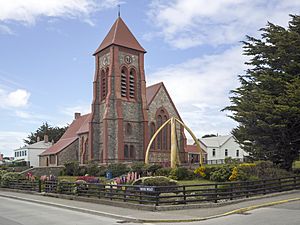
The Falkland Islands population is quite similar. Most people are descended from Scottish and Welsh immigrants. These people settled there after 1833. Falkland-born people also have roots from English and French people, Gibraltarians, Scandinavians, and South Americans. The 2016 census showed that 43% of residents were born on the islands. Foreign-born residents have blended into the local culture. The legal term for living rights is "belonging to the islands." In 1983, Falkland Islanders were given full British citizenship.
The population of the islands decreased a lot in the 1900s. Many young islanders moved away. They looked for education, a modern lifestyle, and better jobs. Many went to the British city of Southampton. This city became known as "Stanley North" on the islands. In recent years, the population decline has slowed. This is thanks to immigrants from the United Kingdom, Saint Helena, and Chile.
In the 2012 census, most residents said their nationality was Falkland Islander (59%). Next were British (29%), Saint Helenian (9.8%), and Chilean (5.4%). A small number of Argentines also live on the islands.
The Falkland Islands have a low population density. According to the 2012 census, the average daily population was 2,932. This number does not include military personnel and their families. A 2012 report counted 1,300 military staff and 50 British Ministry of Defense civilians. Stanley is the most populated place, with 2,121 residents. Next is Mount Pleasant (369 residents, mostly air-base workers). Camp has 351 residents. The islands' population is mostly working-age adults (20–60). There are more males than females (53% to 47%). This difference is clearest in the 20–60 age group.
In the 2012 census, most islanders (66%) said they were Christian. 32% said they had no religion. The remaining 2% followed other religions. These included the Baháʼí Faith, Buddhism, and Islam. The main Christian groups are Anglicanism and other Protestantism, and Roman Catholicism.
Education in the Falkland Islands follows England's system. It is free and required for children aged 5 to 16. Primary education is available in Stanley, RAF Mount Pleasant (for military children), and some rural areas. Secondary education is only in Stanley. It offers boarding and 12 subjects up to General Certificate of Secondary Education (GCSE) level. Students aged 16 or older can study in colleges in England. They can get their GCE Advanced Level or job-related qualifications. The Falkland Islands government pays for older students to attend higher education. This is usually in the United Kingdom.
Falklands culture is based on British traditions. But it has also been influenced by Hispanic South America. Falklanders still use some words and place names from the old Gaucho inhabitants. English is the main and official language. The main dialect is British English. However, some people also speak Spanish. According to naturalist Will Wagstaff, "the Falkland Islands are a very social place, and stopping for a chat is a way of life."
The islands have one weekly newspaper, The Penguin News. Television and radio usually show programs from the United Kingdom. Wagstaff describes the local food as "very British." They use many home-grown vegetables, local lamb, mutton, beef, and fish. "Homemade cakes and biscuits with tea or coffee" are common snacks. Social activities are "typical of that of a small British town." There are many clubs and organizations for community life.
Sports and Games
Despite being small, the Falkland Islands compete in the Commonwealth Games and Island Games. The Falkland Islands national cricket team is a member of the International Cricket Council.
 In Spanish: Islas Malvinas (territorio británico de ultramar) para niños
In Spanish: Islas Malvinas (territorio británico de ultramar) para niños
 | George Robert Carruthers |
 | Patricia Bath |
 | Jan Ernst Matzeliger |
 | Alexander Miles |




